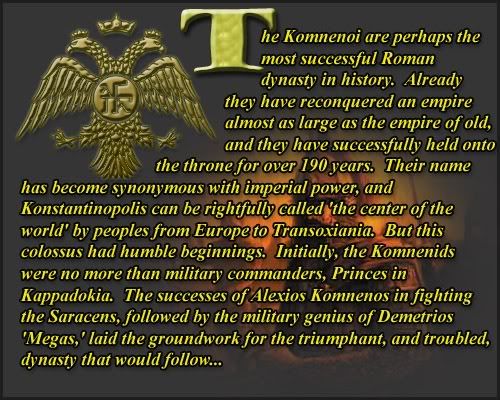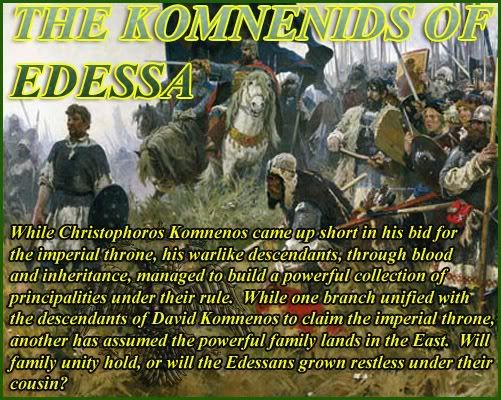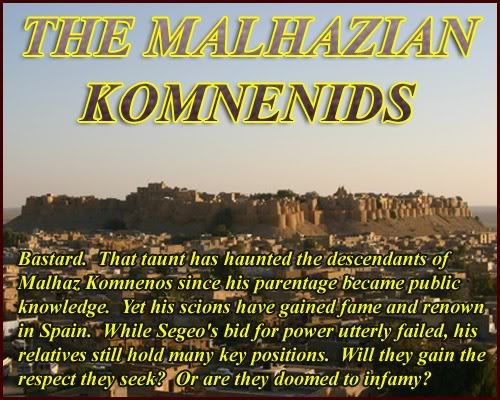That Caliph ploy is a wonderfully wicked idea, BT! Also, I really like what little Aleksandros has become.

Rome AARisen - a Byzantine AAR
- Thread starter General_BT
- Start date
-
We have updated our Community Code of Conduct. Please read through the new rules for the forum that are an integral part of Paradox Interactive’s User Agreement.
You are using an out of date browser. It may not display this or other websites correctly.
You should upgrade or use an alternative browser.
You should upgrade or use an alternative browser.
Yeah, the Muslim world in the 13th century was very different from what it's like today.
As an aside... while this Caliph thing is an interesting turn in the story, how likely would it be in reality that someone like the exiled Caliph acts purely on a single letter?? Wouldn't he send agents to contact the Persian Emperor, before he comes in person? Anyone can write letters...
Or is the Caliph become such an impoverished outcast in the lands of the Mongols, that he doesn't have anyone capable of conducting diplomacy in his retinue any more?
As an aside... while this Caliph thing is an interesting turn in the story, how likely would it be in reality that someone like the exiled Caliph acts purely on a single letter?? Wouldn't he send agents to contact the Persian Emperor, before he comes in person? Anyone can write letters...
Or is the Caliph become such an impoverished outcast in the lands of the Mongols, that he doesn't have anyone capable of conducting diplomacy in his retinue any more?
Or is the Caliph become such an impoverished outcast in the lands of the Mongols, that he doesn't have anyone capable of conducting diplomacy in his retinue any more?
More likely all he needed to march on weakened Persia was an excuse
Why are alot of people talking about Persia as a shiite area? Historically it was for the most part Sunni well until the Safavid takeover in the 16th century. Moreover, one should point out that the Nizaris and Ishmaelis - the few shia in Iran proper fled to Egypt earlier.
I thought there were some in Iran around this time the Buwayyids or something like that? Edit - I looked them up, I think they're a century or two before where the story is at now.
I guess this history has diverged quite a bit, so it's really impossible to know whether the people would still follow the same sect as in our 13th century, I just know Iran has a predominantly Shi'ite populace in the 21st century, and didn't think it would be different then.
As an aside... while this Caliph thing is an interesting turn in the story, how likely would it be in reality that someone like the exiled Caliph acts purely on a single letter?? Wouldn't he send agents to contact the Persian Emperor, before he comes in person? Anyone can write letters...
Or is the Caliph become such an impoverished outcast in the lands of the Mongols, that he doesn't have anyone capable of conducting diplomacy in his retinue any more?
If the Caliph ignores the letter, he stays a religious figurehead, a (probably underfunded and closely watched) client of the Turks who are clients of the Komnenoi.
If he takes the position that the letter is genuine (whether he believes it to be or not) he has a chance at moving up a step, getting a nice mansion in Baghdad, and being a client beholden only to the Komnenoi--which might actually increase Caliphal power, since the Komnenoi, unlike the Turks, probably wouldn't care what the Caliph did with his religious authority, as long as he stayed out of politics.
If the Caliph's gamble fails and Gabriel denies him Baghdad, he can then stand back, piously neutral, let the mob or the Turks tear at Gabriel on his behalf, and then step in and back the winning side in return for some political or monetary concessions. Even in the worst case scenario it's unlikely Gabriel or the Sultan would actually dare to kill the Caliph, the worst they could do would be to exile him, which likely wouldn't make him that much worse off than he was before he got the letter.
...Or so a confident and ambitious Caliph might reason. It could be a horrendous miscalculation of course, but it's a calculation that would be in character for a client state's client who is nominally the highest secular authority in all creation.
...Even in the worst case scenario it's unlikely Gabriel or the Sultan would actually dare to kill the Caliph, the worst they could do would be to exile him, which likely wouldn't make him that much worse off than he was before he got the letter...It could be a horrendous miscalculation...
Wouldn't be any crazier than killing a Pope...
Nice little plot to mess things up in Persia. It'll be interesting to see how things turn out there.
But I must admit that I'm very interested to see what the French do. They surely can't hope to defeat Rome in a war so any strike to the south would be a disaster, but then again you've already noted that their army is far too large to just be used against 'desolate' Scotland.
But I must admit that I'm very interested to see what the French do. They surely can't hope to defeat Rome in a war so any strike to the south would be a disaster, but then again you've already noted that their army is far too large to just be used against 'desolate' Scotland.
I followed a link to this thread from a post that you made on my thread, and started reading. However...it wasn't until I reached the bottom of the page where I realized...that it's 255 pages long! Now I'm going to have to wade through all those pages to read it...thanks a lot! 
Just joshing you. It looks great...but now I'll have to read the next 254 pages.
Just joshing you. It looks great...but now I'll have to read the next 254 pages.
If the Caliph ignores the letter, he stays a religious figurehead, a (probably underfunded and closely watched) client of the Turks who are clients of the Komnenoi.
If he takes the position that the letter is genuine (whether he believes it to be or not) he has a chance at moving up a step, getting a nice mansion in Baghdad, and being a client beholden only to the Komnenoi--which might actually increase Caliphal power, since the Komnenoi, unlike the Turks, probably wouldn't care what the Caliph did with his religious authority, as long as he stayed out of politics.
If the Caliph's gamble fails and Gabriel denies him Baghdad, he can then stand back, piously neutral, let the mob or the Turks tear at Gabriel on his behalf, and then step in and back the winning side in return for some political or monetary concessions. Even in the worst case scenario it's unlikely Gabriel or the Sultan would actually dare to kill the Caliph, the worst they could do would be to exile him, which likely wouldn't make him that much worse off than he was before he got the letter.
...Or so a confident and ambitious Caliph might reason. It could be a horrendous miscalculation of course, but it's a calculation that would be in character for a client state's client who is nominally the highest secular authority in all creation.
Well his actions are entirely reasonable, if he takes the letter to be genuine.
But shouldn't a man of his importance want to stretch out his feelers to see what the motivation of the inviter are, before he loads his household on a caravan and goes off to Persia?? I mean, if he was a Byzantine, he'd already have sent out spies and negotiators to contact the Romans, and by the time he arrived in Rayy he'd be aware of their intentions and know something about the sort of envrionment he's entering.
It seems unlikely for a man of his importance to just take an invitation letter at face value, hop on his camel and ride off into whatever fate awaits him in Persia...
The Caliphs are the kind of guys that told Mongol hordes to stuff it because they thought everyone would rush to bail them out of a jam.
Masters of politics they ain't.
Masters of politics they ain't.
The Caliphs are the kind of guys that told Mongol hordes to stuff it because they thought everyone would rush to bail them out of a jam.
Masters of politics they ain't.
I went and checked out the Wikipedia article on them. You're right, they were not very clever :rofl:
Tommy4ever – Thank you for the nomination! Six times nominated is a humbling thing. As always, I’d first like to thank all of you who read, comment, or share ideas—it’s my fervent belief that most of the characters wouldn’t be half as interesting without all the reader feedback that goes on in AARland! Thank you!
As for the French, Andronikos et al think it’s too large for Scotland. Andronikos et al have no idea there’s a Komnenid presence in “that desolate country.” Perhaps Gaston is telling his brother to be extra cautious? Or are the French up to something more sinister? Or is everyone wrong and Hugues is simply making another go at Burgundy, with or without his brother’s approval?
TC Pilot – The Caliphs by the 13th century acted as if they had power that they’d effectively lost back in the 10th century. I’m sure the last Abbasid Caliph in Baghdad felt as if he had the authority and pull to rally the Muslim world to his defense—his belief was just somewhat delusional…
Leviathan07 – Those would all be reasonable things to expect the Caliph to do… if he had the resources to do so. Perhaps the Caliph is grasping at straws here, but the Abbasid Caliphate is in a precarious state. The Caliphs have basically been on the run since Baghdad fell almost 50 years before—they’ve been all over the Arabian peninsula and are now living in Balkh. I can imagine that they don’t have the best relations with their Turkish hosts either—the Turks are Roman allies, and the Caliph is no doubt constantly haranguing them asking them to retake Baghdad for him. I have no doubt the Turks are quite eager to see their ‘guest’ leave—perhaps they fed him false confirmations when they found out about the letter? We’ll have to see.
Nosnits – It’s a lengthy, lengthy tale. Thank you for being brave enough to start it! Let me know what you think as you read along!
Kirsch27 – It wouldn’t be much worse than killing a pope in terms of outrage and rebellion, but Persia is only one part of the Empire—and I doubt it could stand the mass revulsion and fury that would grip the Muslim world if a Caliph was killed. Besides, it wouldn’t be a politically smart move. Alive, the Caliph is a symbol, but dead, he’s a martyr…
As for pretty purple cloaks, aren’t they just as conspicuous as the purple boots an emperor is expected to wear on the battlefield?
Antoku – A politically astute Caliph might leap down that road you’ve laid out. It could simply be the Caliph thinks this is a win-win situation—either he gets back to Baghdad, or he starts chaos that could very well lead him back into Baghdad, perhaps with an army and political authority to match his spiritual power. That counts on this Caliph being clever on the level of the Komnenids—in real life, contemporary Caliphs were not. Rome AARisen, however, isn’t necessarily historically accurate!
Frozenwall – Even just showing up at Persia’s doorstep can be potent—and Gabriel being distracted by Konstantinopolis and the Mongols likely isn’t exactly a secret…
Qorten – Wicked and devious? Yes. Expect more of that from Andronikos. Will his plan’s succeed however? That remains to be seen….
Calipah – Yup… the Nizaris and Ismailis fled to Egypt in the late 1230s and 1240s. Egypt is currently the Shi’a hotbed…
Enewald – Off the top of my head -- Mosul, Shirvan, Derbent, Tabriz, Karbala, Basra, Luristan, Hormuz, Isfahan, Mazadaram, Khozistan, Hamadan—that’s 11 I can think of… as for the Immortals, the main empire already has them—the Athanatakoi tagma. Athanatakoi, both in the AAR and historically, were the Empire’s attempt at creating a copy of the ‘Immortals.’ The name itself is a Greek translation…
Nehekara – That would depend on how many provinces there are in the Turkish lands.
Vesimir – Why does it have to be pleasant? Cold, detached arranged marriages are just as common as ones where the couples learn to love each other. But, we shall see. Perhaps she’ll put up with his shenanigans, perhaps he’ll put up with having to ‘visit’ her sometimes. And I wanted this update to get a chance to show the double-side of Andronikos—he’s very very cold hearted and ruthless, but he loves Cecilia and his kids to death…
asd21593 – Does deliciously evil taste like white chocolate? If so, I’m in!
RGB – Since when did Andronikos need a casus aggraves?
First, hopefully soon we’ll have an update from Scotland on Lord Protector Antemios made by our very own AlexanderPrimus! He’s been feeling under the weather so it’s been pushed back some, but I am sure it will be well worth the wait!
To tide us over in the meantime—I went and finally did it.
After months having the information sitting around, gathering dust, I decided to compile the Komnenid family tree as it stands in 1271. By necessity, there are many branches that have been pruned—families that become irrelevant, or shift back into courtierdom, are cut off. But, in terms of where the families are, and who the movers and shakers are, this should, I hope, help satisfy people’s curiosity. Be forewarned, the family tree files themselves are large—much larger than the forum allows, so I merely linked to them. That said, enjoy, and click on each image below to see the family tree of the initial Komnenid family, as well as the major branches that followed…
EDIT: A couple notes for helping people navigate through this behemoth:
1 - With the exception of marriages that were either a) important dynastically (Sophie marrying Basil, Anastasia marrying Alexios), or b) marriages I'd like for my own reference going forward (Orsinis, etc.), marriage and distaff families aren't represented
2 - A black line indicates primary descent.
3 - A gray line is a marriage
4- Bastards that were unlegitimized, with the exception of Malhaz and his descendants, are not included.
5 - Almost all the major Komnenid families (with the exception of House Antioch) trace their descent from either Emperor Manuel (Basiliene, Eudoxene-Egypt, Leonene-South Italy), or Demetrios Megas (Christophorene, Malhazian).
6 - With the exception of Leo's brief Italian realm at the start of the 13th century, all the Emperors from 1189 onwards have been descended in some way, shape or form from Basilieos III Komnenos.
As for the French, Andronikos et al think it’s too large for Scotland. Andronikos et al have no idea there’s a Komnenid presence in “that desolate country.” Perhaps Gaston is telling his brother to be extra cautious? Or are the French up to something more sinister? Or is everyone wrong and Hugues is simply making another go at Burgundy, with or without his brother’s approval?
TC Pilot – The Caliphs by the 13th century acted as if they had power that they’d effectively lost back in the 10th century. I’m sure the last Abbasid Caliph in Baghdad felt as if he had the authority and pull to rally the Muslim world to his defense—his belief was just somewhat delusional…
Leviathan07 – Those would all be reasonable things to expect the Caliph to do… if he had the resources to do so. Perhaps the Caliph is grasping at straws here, but the Abbasid Caliphate is in a precarious state. The Caliphs have basically been on the run since Baghdad fell almost 50 years before—they’ve been all over the Arabian peninsula and are now living in Balkh. I can imagine that they don’t have the best relations with their Turkish hosts either—the Turks are Roman allies, and the Caliph is no doubt constantly haranguing them asking them to retake Baghdad for him. I have no doubt the Turks are quite eager to see their ‘guest’ leave—perhaps they fed him false confirmations when they found out about the letter? We’ll have to see.
Nosnits – It’s a lengthy, lengthy tale. Thank you for being brave enough to start it! Let me know what you think as you read along!
Kirsch27 – It wouldn’t be much worse than killing a pope in terms of outrage and rebellion, but Persia is only one part of the Empire—and I doubt it could stand the mass revulsion and fury that would grip the Muslim world if a Caliph was killed. Besides, it wouldn’t be a politically smart move. Alive, the Caliph is a symbol, but dead, he’s a martyr…
As for pretty purple cloaks, aren’t they just as conspicuous as the purple boots an emperor is expected to wear on the battlefield?
Antoku – A politically astute Caliph might leap down that road you’ve laid out. It could simply be the Caliph thinks this is a win-win situation—either he gets back to Baghdad, or he starts chaos that could very well lead him back into Baghdad, perhaps with an army and political authority to match his spiritual power. That counts on this Caliph being clever on the level of the Komnenids—in real life, contemporary Caliphs were not. Rome AARisen, however, isn’t necessarily historically accurate!
Frozenwall – Even just showing up at Persia’s doorstep can be potent—and Gabriel being distracted by Konstantinopolis and the Mongols likely isn’t exactly a secret…
Qorten – Wicked and devious? Yes. Expect more of that from Andronikos. Will his plan’s succeed however? That remains to be seen….
Calipah – Yup… the Nizaris and Ismailis fled to Egypt in the late 1230s and 1240s. Egypt is currently the Shi’a hotbed…
Enewald – Off the top of my head -- Mosul, Shirvan, Derbent, Tabriz, Karbala, Basra, Luristan, Hormuz, Isfahan, Mazadaram, Khozistan, Hamadan—that’s 11 I can think of… as for the Immortals, the main empire already has them—the Athanatakoi tagma. Athanatakoi, both in the AAR and historically, were the Empire’s attempt at creating a copy of the ‘Immortals.’ The name itself is a Greek translation…
Nehekara – That would depend on how many provinces there are in the Turkish lands.
Vesimir – Why does it have to be pleasant? Cold, detached arranged marriages are just as common as ones where the couples learn to love each other. But, we shall see. Perhaps she’ll put up with his shenanigans, perhaps he’ll put up with having to ‘visit’ her sometimes. And I wanted this update to get a chance to show the double-side of Andronikos—he’s very very cold hearted and ruthless, but he loves Cecilia and his kids to death…
asd21593 – Does deliciously evil taste like white chocolate? If so, I’m in!
RGB – Since when did Andronikos need a casus aggraves?
First, hopefully soon we’ll have an update from Scotland on Lord Protector Antemios made by our very own AlexanderPrimus! He’s been feeling under the weather so it’s been pushed back some, but I am sure it will be well worth the wait!
To tide us over in the meantime—I went and finally did it.
After months having the information sitting around, gathering dust, I decided to compile the Komnenid family tree as it stands in 1271. By necessity, there are many branches that have been pruned—families that become irrelevant, or shift back into courtierdom, are cut off. But, in terms of where the families are, and who the movers and shakers are, this should, I hope, help satisfy people’s curiosity. Be forewarned, the family tree files themselves are large—much larger than the forum allows, so I merely linked to them. That said, enjoy, and click on each image below to see the family tree of the initial Komnenid family, as well as the major branches that followed…
EDIT: A couple notes for helping people navigate through this behemoth:
1 - With the exception of marriages that were either a) important dynastically (Sophie marrying Basil, Anastasia marrying Alexios), or b) marriages I'd like for my own reference going forward (Orsinis, etc.), marriage and distaff families aren't represented
2 - A black line indicates primary descent.
3 - A gray line is a marriage
4- Bastards that were unlegitimized, with the exception of Malhaz and his descendants, are not included.
5 - Almost all the major Komnenid families (with the exception of House Antioch) trace their descent from either Emperor Manuel (Basiliene, Eudoxene-Egypt, Leonene-South Italy), or Demetrios Megas (Christophorene, Malhazian).
6 - With the exception of Leo's brief Italian realm at the start of the 13th century, all the Emperors from 1189 onwards have been descended in some way, shape or form from Basilieos III Komnenos.
Last edited:
Fantastic!
What of renaming the Komnenoid branches after their principalities?
Like what happened to Capets in France...
What of renaming the Komnenoid branches after their principalities?
Like what happened to Capets in France...
Gorgeous titles!
And that's just so much work that no sane person would attempt it
And that's just so much work that no sane person would attempt it
Amazing work here. Very interesting and nice to look over so many characters and see their inter-relations. I feel some of your strongest characters seem to have come in the 12th century (Nikolaios is a favourite whilst Manuel was plain fun and thrilling to read about). Although I never was a fan of the likes of Gabriel who has dominated much of the 13th century.
Some of the Malhazian Komnenid names made me laugh. Like Fernando Komnenos - Spanish names don't fit in well with Greek surnames.
Just noticed Lorenzo di Medici is married to a Leonine Komnenid called Helene. Nice.
The Antioch Komnenids are amongst the most interesting. We don't hear much about them in your story and they seem to be far away from power in Constantinople. Yet they are the ultimate provincials with lands across the East of the Empire from Georgia to the Levant. Very interesting.
As you may have been able to tell I really enjoyed your family trees. Graphically appealling and deeply interesting. Well done!
Some of the Malhazian Komnenid names made me laugh. Like Fernando Komnenos - Spanish names don't fit in well with Greek surnames.
Just noticed Lorenzo di Medici is married to a Leonine Komnenid called Helene. Nice.
The Antioch Komnenids are amongst the most interesting. We don't hear much about them in your story and they seem to be far away from power in Constantinople. Yet they are the ultimate provincials with lands across the East of the Empire from Georgia to the Levant. Very interesting.
As you may have been able to tell I really enjoyed your family trees. Graphically appealling and deeply interesting. Well done!
Awesome! Beautiful! Amazing! Those are just few of the words that begin to describe what you've done. It's possible I will actually know who's who now. 
One thing bothers me though. Iago Komnenos from the Malhaz branch is the komnenoi of... Paris?
One thing bothers me though. Iago Komnenos from the Malhaz branch is the komnenoi of... Paris?
I doubt the branches would ever abandon the name Komnenos, it's far too valuable. As for the trees, I forgot just how many Komnenoi there are. Perhaps some Manueline pruning is in order...








